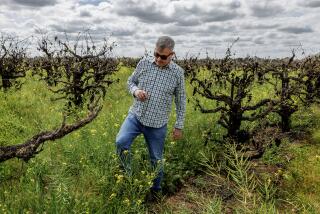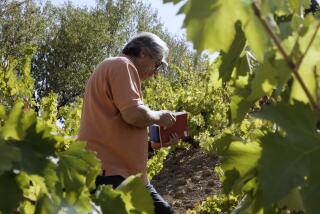Popular Greek Wine Is Rained Out for the Year
- Share via
NEMEA, Greece — The blood of Hercules has run dry.
Normally in the fall, the ancient vineyards in the Nemea region of southern Greece would be making the year’s vintage of the deep red wine often called “Hercules’ blood.”
This season, the grapes are rotting on the vine.
Unusually heavy rains during the important pre-harvest period in late August wiped out the Nemea crop. The same immense storm system ravaged central Europe and caused billions of dollars worth of damage.
For this small patch in Europe’s southeastern corner, the devastation was near total. There will be no 2002 vintage of Nemea red, one of the most popular wines in Greece.
“It was looking like a good year, but then it rained every day and the grapes couldn’t take it,” grower Giorgos Balafas said. “I have [five acres] and nothing survived.... We had no chance.”
The typically hot and dry August weather is needed for the Nemea grapes to properly ripen. Strong-tasting and iodine red, the wine is often referred to as “Hercules’ blood” after the mythological hero who strangled a lion in this beautiful valley at the start of his Twelve Labors that set him on the course for immortality.
The 2,330-year-old Temple of Zeus -- Hercules’ father -- stands in the middle of the fabled region’s vineyards, about 90 miles southwest of Athens. Wine making in the area stretches back to antiquity when Nemea was one of the four hosts of the ancient Olympics.
This year, grapes hang shriveled and marked by patches of mold across about 5,000 acres of vineyards. More than 95% of Nemea’s trademark grape -- Agiorgitiko -- was destroyed by the freak weather.
Vintners suffered damage throughout Europe. In Italy, growers in several key regions predict lower yields and quality for this season’s wines.
But nowhere was the damage as severe as in Nemea, where individual growers lost from 90% to 100% of their grapes.
The head of Nemea’s wine cooperative, Giorgos Pigadiotis, pulled out a bunch of withered grapes and threw them on the ground.
“They are so light, there’s nothing left inside them,” he said.
The annual yield of Nemea grapes normally totals more than 15,000 metric tons of wine. “There won’t even be enough wine this year to fill a barrel in my cellar,” Pigadiotis said.
Many Greeks favor Nemea over other domestic reds for its stability and price. A bottle of “Hercules blood” ranges from about $3.90 to $7.85 at shops, and it’s about $1.95 a bottle if bought straight from the barrel.
Consumers in the main export markets -- Germany, the Netherlands, France and Belgium -- will also be affected, although sales there will be cushioned some because Nemea had a bumper harvest last year.
The rain has left Nemea farmers campaigning to get financial assistance from the government, as promised by Agriculture Minister Giorgos Drys, who toured the region in late September.
“This would have been a great year ... but unfortunately, the rains and the dampness came before the harvest,” said wine chemist Christos Peppas, who works at the cooperative. “The Agiorgitiko is a very sensitive variety. It’s a big grape and it rots easily.”
Next year?
“If it rains that often and that hard, there’s nothing farmers can do,” he said. “It’s up to the sky.”
More to Read
Eat your way across L.A.
Get our weekly Tasting Notes newsletter for reviews, news and more.
You may occasionally receive promotional content from the Los Angeles Times.










